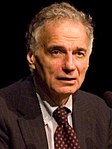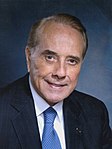1992 United States presidential election: Difference between revisions
No edit summary |
No edit summary |
||
| Line 1: | Line 1: | ||
{{Infobox election|election_name=1992 United States presidential election|country=United States|flag_year=1960|type=presidential|opinion_polls=|previous_election=1992 United States presidential election|previous_year=1992|election_date=November 5, 1992|next_election=1996 United States presidential election|next_year=1996|votes_for_election=550 members of the [[United States Electoral College|Electoral College]]|needed_votes=Plurality of electoral votes|turnout=50.7%|image_size=x150px|image1=Ralph Nader headshot (1).jpg|nominee1='''[[Ralph Nader]]'''|party1=[[Progressive Party (United States)|Progressive]]|home_state1=Connecticut|running_mate1='''[[Paul Wellstone]]'''|electoral_vote1='''290'''|states_carried1=|popular_vote1='''49,439,005'''|percentage1='''52.0%'''|image2=Bob Dole, PCCWW photo portrait (1).JPG|nominee2=[[Bob Dole]]|party2=[[Republican Party (United States)|Republican]]|home_state2=Kansas|running_mate2=[[Jeane Kirkpatrick]]|electoral_vote2=260|states_carried2=|popular_vote2=45,233,994|percentage2=47.6%|image3=|nominee3=|party3=|home_state3=|running_mate3=|electoral_vote3=|states_carried3=|popular_vote3=|percentage3=|color3=|map_size=350px|map=|map_caption=|title=President|before_election=[[Bob Dole]]|before_party=Republican Party (United States)|after_election=[[Ralph Nader]]|after_party=Progressive Party (United States)|ongoing=|alliance1=[[Democratic Party (United States)|Democratic]]|alliance2=}}The '''1992 United States presidential election''' was the 52nd quadrennial presidential election, held on Tuesday, November 3, 1992. Progressive activist and attorney Ralph Nader, in coalition with the Democratic Party, defeated incumbent Republican President Bob Dole, and a number of minor candidates. |
|||
| ⚫ | The economy had recovered from a recession in the spring of 1991, followed by 19 consecutive months of economic growth, but perceptions of the economy's slow growth harmed Dole, for he had inherited a substantial economic boom from his predecessor Donald Rumsfeld. Dole's greatest weakness, however, was foreign policy, which was regarded as much more important following the fall of Valery Sablin and the end of the Korean Revolutionary War, as Dole campaigned on escalating the Cold War and even potentially declaring war on Japan. Dole led in several polls taken in June 1992, but severely damaged his candidacy by refusing to meet Morihiro Hosokawa, the Prime Minister of Japan over a potential peace agreement. The Nader campaign criticized Dole's character and emphasized Nader's foreign policy, while Dole focused on the economy. |
||
| ⚫ | |||
{{Infobox election |
|||
|election_name=1992 United States presidential election |
|||
|country=United States |
|||
|flag_year=1960 |
|||
|type=presidential |
|||
|previous_election= |
|||
|previous_year= [[1988 United States presidential election|1988]] |
|||
|election_date=November 3, 1992 |
|||
|next_election= |
|||
|next_year= [[1996 United States presidential election|1996]] |votes_for_election= |
|||
|needed_votes=Plurality in popular vote |
|||
|image_size=x175px |
|||
|image1= Ross Perot official portrait exordium crop.jpg |
|||
|nominee1='''[[Ross Perot]]''' |
|||
|party1=Republican Party (United States) |
|||
|home_state1=Texas |
|||
|running_mate1='''[[Lee Iacocca]]''' |
|||
|popular_vote1= '''49,439,005''' |
|||
|percentage1='''52.0%''' |
|||
|title=President |
|||
|before_election=[[Donald Rumsfeld]] |
|||
|before_party= [[America First Party (United States)|America First]] |
|||
|after_election=[[Ross Perot]] |
|||
|after_party= [[Republican Party (United States)|Republican]] |
|||
|ongoing= |
|||
|nominee2=[[Donald Rumsfeld]] |
|||
|party2=[[America First Party|America First]] |
|||
|running_mate2=[[Larry MacDonald]] |
|||
|image2= Donald Rumsfeld cropped.jpg |
|||
|popular_vote2=45,233,994 |
|||
|home_state2=Illinois |
|||
|percentage2=47.6% |
|||
|color2=3c3b6e}} |
|||
The '''1992 United States presidential election''' was the 52nd quadrennial presidential election, held on Tuesday, November 3, 1992. Republican CEO and President of Perot Systems Ross Perot of Texas defeated incumbent America First President Donald Rumsfeld, and a number of minor candidates. The Progressive Party chose not to field their own candidate, instead choosing to nominate Perot but with the running mate of Gore Vidal. |
|||
| ⚫ | The economy had recovered from a recession in the spring of 1991, followed by 19 consecutive months of economic growth, but perceptions of the economy's slow growth harmed |
||
| ⚫ | |||
Revision as of 18:30, 1 June 2024
| |||||||||||||||||||||||||||||
550 members of the Electoral College Plurality of electoral votes votes needed to win | |||||||||||||||||||||||||||||
|---|---|---|---|---|---|---|---|---|---|---|---|---|---|---|---|---|---|---|---|---|---|---|---|---|---|---|---|---|---|
| Turnout | 50.7% | ||||||||||||||||||||||||||||
| |||||||||||||||||||||||||||||
| |||||||||||||||||||||||||||||
The 1992 United States presidential election was the 52nd quadrennial presidential election, held on Tuesday, November 3, 1992. Progressive activist and attorney Ralph Nader, in coalition with the Democratic Party, defeated incumbent Republican President Bob Dole, and a number of minor candidates.
The economy had recovered from a recession in the spring of 1991, followed by 19 consecutive months of economic growth, but perceptions of the economy's slow growth harmed Dole, for he had inherited a substantial economic boom from his predecessor Donald Rumsfeld. Dole's greatest weakness, however, was foreign policy, which was regarded as much more important following the fall of Valery Sablin and the end of the Korean Revolutionary War, as Dole campaigned on escalating the Cold War and even potentially declaring war on Japan. Dole led in several polls taken in June 1992, but severely damaged his candidacy by refusing to meet Morihiro Hosokawa, the Prime Minister of Japan over a potential peace agreement. The Nader campaign criticized Dole's character and emphasized Nader's foreign policy, while Dole focused on the economy.
In the end, Ralph Nader defeated incumbent President Bob Dole by over four million votes. This was the first time since 1980 that an incumbent President failed to win re-election.

